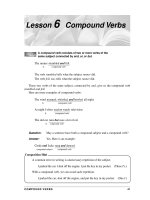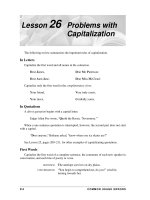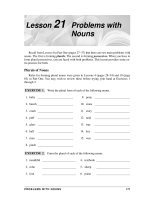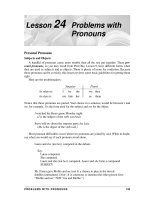Grammar And Usage For Better Writing - Basic Paragraph Composition
Bạn đang xem bản rút gọn của tài liệu. Xem và tải ngay bản đầy đủ của tài liệu tại đây (74.13 KB, 27 trang )
231
Part
Four
Basic
Paragraph
Composition
Just as words form sentences, so sentences form paragraphs. In Part Two, we learned
that good sentences are concise, clear, unified, varied, and interesting. A good paragraph
has all these qualities, too. Yet with paragraphs, we are thinking in “bigger” terms—how
sentences relate to one another rather than how words do. Paragraphs themselves are the
building blocks for essays, term papers, book reports, business letters, and so on. Mastering
the techniques of effective paragraph composition, then, will go a long way toward ensur-
ing your success in the critical skill of essay writing.
The lessons in Part Four show you ways to create paragraphs that will stay on track
and keep your readers reading.
232 BASIC PARAGRAPH COMPOSITION
Lesson
28
The Paragraph
A paragraph is a group of sentences telling about one topic.
For example, read the following two paragraphs about Lance Armstrong:
From an early age, Lance Armstrong demonstrated superior athletic
ability and a competitive streak. These qualities helped him win the Kids
Triathlon at age 13 and, at age 16, become a professional triathlete. The cy-
cling part of the triathlon became his focus, and he devoted his life to pro-
fessional cycling. In that sport he has excelled as national and world cham-
pion, as Olympian, and as record-tying five-time winner of the Tour de
France. He is surely one of the all-time great cyclists.
His path, however, has not been without obstacles and pain. In October
1996, he discovered that he had testicular cancer that had advanced and
spread to his brain and lungs. The determination that had carried him through
win after win in cycling now kicked in to help him combat the deadly dis-
ease. And combat he did. After surgery and chemotherapy, Lance became a
cancer survivor. Profoundly affected by his battle for life, he dedicated him-
self to becoming a spokesperson for cancer awareness and survivorship.
Question:
Why does a new paragraph begin with the sentence “His path, how-
ever, has not been without obstacles and pain”?
Answer:
This is a new topic.
The first paragraph deals with Lance’s achievement in cycling. All sentences in this
paragraph deal with this topic.
The second paragraph moves on to another topic: Lance’s battle with and victory over
cancer. All sentences in this paragraph deal with this topic.
Note that the beginning of a paragraph is indented; that is, the first word is moved a
short space to the right of the margin.
Summary: A paragraph is a group of sentences telling about one topic. When you
come to a new topic, begin a new paragraph. Remember to indent
when you start a paragraph.
A Note About Paragraph Length
How long should a paragraph be? Quite simply, it should be as long as it needs to be. A
paragraph that is developing a topic does not consist of a predetermined number of sen-
tences. However, very long paragraphs (say, a page long) often seem forbidding to the
reader. Very short ones—one or two sentences—may be used, but only with care. Some-
times the one-sentence paragraph can make a point dramatically. A series of one-sentence
paragraphs, though, makes your writing disjointed and leaves the reader with the impres-
sion that you have not developed your subject.
EXERCISE.
Write a two-paragraph composition beginning with the words The most
stressful day that I remember . . .
It is a good idea to write about something you have actually lived through. Here are
examples:
The day I fell from a ladder The day our car was stolen
The day we moved from Ridgefield The day I started high school
Suggestions for the First Paragraph
1. Tell what day it was (The day I fell from a ladder). Give the exact date, if possi-
ble. Say how old you were at the time.
2. Topic of the first paragraph: the day of the accident.
Suggestions for the Second Paragraph
1. Give further details (information). For example, if you are writing about the day
you fell from a ladder, tell how the accident happened and how badly you were
hurt.
2. Topic of the second paragraph: details of the accident.
The following model composition shows one way of writing the two paragraphs.
Model Composition
The most stressful day that I remember is the day I fell from a ladder. It
was July 4, 2000. I was almost thirteen at the time.
My father, who was working in the attic over our garage, had just asked
me to hand him a piece of lumber. As I climbed up the ladder to give it to
him, the ladder swayed and I fell on my back against the concrete floor.
Immediately, I was in pain and shock. The breath had been knocked out of
me. As I was being rushed to the hospital, I kept thinking I might never be
able to walk again. To my relief, it turned out that there was no fracture, but
my back was sore for a couple of days.
THE PARAGRAPH 233
Now write your two-paragraph composition.
234 BASIC PARAGRAPH COMPOSITION
The key to effective paragraph writing is unity.
Question 1:
What is unity?
Answer:
Unity comes from the Latin word unus, meaning “one.” Unity means
“oneness.”
A paragraph has unity if it deals with one main topic and all its sentences stick to that
topic—and contribute something to it.
Suppose the first paragraph about Lance Armstrong had been written this way:
From an early age, Lance Armstrong demonstrated superior athletic abil-
ity and a competitive streak. These qualities helped him win the Kids
Triathlon at age 13 and, at age 16, become a professional triathlete. The
cycling part of the triathlon became his focus, and he devoted his life to
professional cycling. In that sport he has excelled as national and world
champion, as Olympian, and as record-tying five-time winner of the Tour de
France. He also started the Lance Armstrong Foundation. He is surely one of
the all-time great cyclists.
Question 2:
Does the above paragraph have unity?
Answer:
No. The sentence He also started the Lance Armstrong Foundation
does not deal with the same topic as that in the rest of the paragraph.
The paragraph speaks about Lance Armstrong’s athletic accomplish-
ments. This sentence spoils the unity of the paragraph and should be
removed.
UNITY IN THE PARAGRAPH 235
Lesson
29
Unity in the
Paragraph
EXERCISE 1.
Some of the following paragraphs have unity; some do not. Read each
paragraph carefully and tell which sentences, if any, are off the topic.
Sample 1:
1
When Benjamin Franklin was a teenager, rivers were not so polluted as they are now.
2
For example, the day he arrived in Philadelphia in 1723, he went down to the wharf for a
drink from the river.
3
Who would dare to drink water straight from a river today?
SENTENCES OFF THE TOPIC
,
IF ANY
: None
(All the sentences deal with one topic: river pollution.)
Sample 2:
1
Amelia Earhart had a brief but remarkable career in aviation.
2
In 1932 she became
the first woman to fly alone across the Atlantic.
3
Three years later, she flew from Hawaii
to California by herself.
4
No one had ever done this before.
5
In 1937, with copilot
Frederick J. Noonan, she tried to fly around the world, but her plane disappeared in the
middle of the Pacific, and no trace of it—or her—was ever found.
6
Amelia’s first career
was teaching.
7
Later, she became a writer.
8
In fact, at the time of her disappearance, she
was married to George P. Putnam, a publisher.
SENTENCES OFF THE TOPIC
,
IF ANY
: Sentences 6, 7, and 8
(The topic is Amelia Earhart’s aviation career. Sentences 6, 7, and 8 do not deal
with that topic.)
Paragraph 1
1
A part-time job has many advantages.
2
First of all, it gives you money
to spend on things you need or like, so that you don’t have to keep asking
for a bigger allowance.
3
Also, if you are thrifty, it enables you to save for
the future, especially for college.
4
But most of all, it gives you a chance to
contribute something to the family’s expenses if your parents need the
money.
5
They are sure to appreciate this help, and you will feel more re-
sponsible and independent.
SENTENCES OFF THE TOPIC
,
IF ANY
:
Paragraph 2
1
What do we mean by “global warming” and what causes it?
2
The sur-
face temperature of the earth has risen by about 1 degree Fahrenheit over
the past century.
3
The term means the warming of earth’s atmosphere be-
lieved to be caused by accumulation of greenhouse gases.
4
The greenhouse
gases mainly are carbon dioxide, methane, and nitrous oxide.
5
Nitrous ox-
ide is sometimes called “laughing gas” and is used by dentists.
6
Many sci-
entists believe that human activities, such as forest burning, use of fossil fu-
els, and nuclear fission, contribute to global warming.
SENTENCES OFF THE TOPIC
,
IF ANY
:
236 BASIC PARAGRAPH COMPOSITION
Paragraph 3
1
Blue whales, the largest animals in the world, are in danger of being
wiped out.
2
Because of their size, they have yielded the highest profits to
the whaling industry, and they have been overhunted.
3
In the past, these
gentle animals had a fighting chance because they had to be harpooned by
hand from small boats at close range.
4
But in our century, they have been
hunted with helicopters, sonar, and exploding harpoons fired from guns.
5
As a result, there may soon be no more blue whales in our oceans if their
endangered status is not respected and laws against illegal hunting are not
enforced.
6
Moby Dick is a novel about a huge white whale by Herman
Melville.
SENTENCES OFF THE TOPIC
,
IF ANY
:
If a paragraph has unity, then, it deals with one subject. There is another aspect of
unity, however. All the sentences tell about one topic, but the sentences must also give
unity by fitting together as a whole, that is, by relating to one another in a clear, logical
way.
Read the following paragraph:
Ms. O’Reilly offered three reasons why students should prepare well
for class. Preparing for class helps develop self-discipline. Self-discipline
is valuable. It promotes focus and organization. Preparing for class teaches
responsibility. Responsibility means fulfillment of obligation, and that is
part of being a good student. Preparing for class boosts learning. It rein-
forces what is being taught in the classroom. Ms. O’Reilly says that stu-
dents who prepare well will benefit in three ways.
Is this a good paragraph? No, it really could be much better. All of the sentences talk about
good class preparation and its benefits, but the sentences themselves seem choppy and
somewhat unrelated.
Now read the revised paragraph:
Ms. O’Reilly offered three reasons why students should prepare well
for class. First, good class preparation helps develop self-discipline, which
is a valuable quality, promoting focus and organization. Second, good
preparation teaches responsibility because it means fulfillment of obliga-
tion, and that is part of being a successful student. Finally, preparation
boosts learning by reinforcing what is being taught in the classroom.
According to Ms. O’Reilly, therefore, students who prepare well will bene-
fit in these three ways.
This paragraph is much better because the sentences are connected to each other. The
words “First,” “Second,” and “Finally” organize the paragraph by clearly setting off the
three reasons, and they act as transitions by linking one to the next. The addition of “there-
fore” to the final sentence unifies the entire paragraph by referring back to Ms. O’Reilly
and her three reasons. Other words commonly used for transition include however, further-
more, moreover, nonetheless, and the like.
UNITY IN THE PARAGRAPH 237
The changes in sentence structure also promote unity in the paragraph. For example, in
the original version, three sentences were devoted to the first reason, self-discipline. In the
revised version, the three sentences become one sentence with interrelated parts.
EXERCISE 2.
Using transitions and variety in sentence structure, revise the follow-
ing paragraph to give it greater unity.
So you would like to teach your dog some tricks? Three factors (be-
sides the dog) are necessary. You must know about the personality and
breed traits of your dog. Some dogs, such as terriers, are acrobatic. You
must know the basics of giving opening commands and closing commands.
The closing command is also called a release. You must also give time to
the training. Each session should last only about five minutes. During the
session, your attention should be focused on the dog. Not all dogs learn at
the same rate, so another factor is patience accompanied by a calm, kind at-
titude. Sometimes the dog will not “get it.” Reward him with a toy or a treat
after every session. Always remember that an old dog can learn new tricks.
238 BASIC PARAGRAPH COMPOSITION
THE TOPIC SENTENCE 239
Lesson
30
The Topic
Sentence
A topic sentence states the topic, or main idea, of a para-
graph. It is usually the first sentence in its paragraph.
Here are some of the topic sentences we have already met:
What do we mean by “global warming” and what causes it?
A part-time job has many advantages.
Amelia Earhart had a brief but remarkable career in aviation.
Question:
Why are topic sentences useful?
Answer:
Topic sentences help us read and write better.
When we read, the topic sentence tells us what the paragraph will be
about.
When we write, if we keep referring back to our topic sentence, it will
keep us from going off the topic.
Not all paragraphs begin with a topic sentence. In fact, many paragraphs do not even
have a topic sentence. Here, however, we are going to practice writing topic sentences be-
cause it is a good way to develop skill in composition.
EXERCISE.
Write a paragraph beginning with one of the topic sentences listed
below. You may use a topic sentence of your own if you wish.
Suggested Topic Sentences
1. Some people just do not return things that they borrow.
2. I enjoy (or do not enjoy) being the oldest (or youngest, or only) child in the
family.
3. Basketball (or some other sport) is an exciting sport to watch.
4. Dogs sometimes surprise us by their cleverness.
5. I like (or do not like) my neighborhood.
6. We waste a good part of our lives standing in lines.
7. The job of a police officer (or nurse) is not an easy one.
8. One of the best programs on television is _____.
9. The _____ team has had a good (or poor) season.
10. Saturday afternoon (or some other time) is the worst (or best) time to shop.
Your paragraph should consist of at least six or seven sentences. A model paragraph
follows to show what you should do.
Model Paragraph
1
Saturday afternoon is the worst time to shop.
2
It is the time when thou-
sands of people rush to do their shopping for the week.
3
That explains why
traffic is heavy on Saturday afternoon.
4
When you finally get to the stores,
the aisles are crowded but the selection is poor.
5
Some of the items on your
shopping list may not be available because they have been sold out.
6
Worst
of all, the lines at the checkout counters are long and slow-moving.
7
By the
time you get home, you will be tired and irritable, and you will probably
have a headache.
Comments:
The model paragraph consists of seven sentences. The topic sentence (S1)
states that Saturday afternoon is the worst time to shop. All the other sen-
tences support this statement.
S2 and S3 show how hard it is to get to the stores on Saturday afternoon.
S4, S5, and S6 describe the difficult conditions in stores on Saturday after-
noon.
S7 deals with the effect of Saturday shopping on the shopper’s nerves and
health.
Note that the paragraph has unity because it deals with one topic, and every
sentence in the paragraph stays on the topic.
240 BASIC PARAGRAPH COMPOSITION









